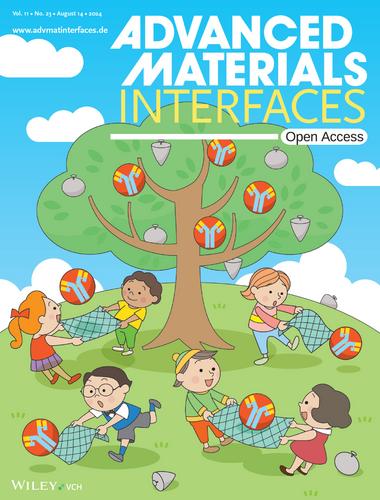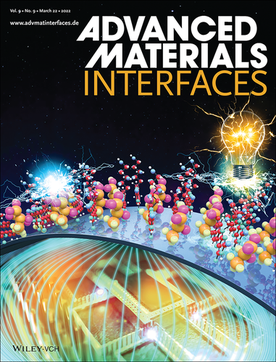聚合物微球的硫醚桥接表面改性为 IgG 提供非生物蛋白 A 拟态亲和力(Adv. Mater. Interfaces 23/2024)
IF 4.3
3区 材料科学
Q2 CHEMISTRY, MULTIDISCIPLINARY
引用次数: 0
摘要
桥接表面修饰就像孩子们成双成对地张开网一样,硫醚桥接修饰的聚合物表面也能选择性地捕捉免疫球蛋白 G (IgG)。此外,它们还表现出缓冲响应性和与 IgG Fc 区域的高亲和性结合,可作为蛋白 A 配体发挥作用。桥接表面修饰方法以及对桥接/非桥接界面上蛋白质相互作用的进一步了解,在广泛的生物应用中可能非常有价值。更多详情,请参阅作者 Takanori Kishida 发表的文章 2301028。本文章由计算机程序翻译,如有差异,请以英文原文为准。

A Thioether-Bridging Surface Modification of Polymeric Microspheres Offers Nonbiological Protein A-Mimetic Affinity for IgG (Adv. Mater. Interfaces 23/2024)
Bridging Surface Modification
Just like the kids spreading their nets in pairs, thioether-bridge-modified polymeric surfaces selectively capture immunoglobulin G (IgG). Furthermore, they exhibit buffer responsiveness and high-affinity binding to the IgG Fc region, acting as protein A ligands. The bridging surface modification approach and the improved understanding of protein interactions at bridged/non-bridged interfaces could be valuable in widespread bio-applications. More details can be found in the article 2301028 by Takanori Kishida.
求助全文
通过发布文献求助,成功后即可免费获取论文全文。
去求助
来源期刊

Advanced Materials Interfaces
CHEMISTRY, MULTIDISCIPLINARY-MATERIALS SCIENCE, MULTIDISCIPLINARY
CiteScore
8.40
自引率
5.60%
发文量
1174
审稿时长
1.3 months
期刊介绍:
Advanced Materials Interfaces publishes top-level research on interface technologies and effects. Considering any interface formed between solids, liquids, and gases, the journal ensures an interdisciplinary blend of physics, chemistry, materials science, and life sciences. Advanced Materials Interfaces was launched in 2014 and received an Impact Factor of 4.834 in 2018.
The scope of Advanced Materials Interfaces is dedicated to interfaces and surfaces that play an essential role in virtually all materials and devices. Physics, chemistry, materials science and life sciences blend to encourage new, cross-pollinating ideas, which will drive forward our understanding of the processes at the interface.
Advanced Materials Interfaces covers all topics in interface-related research:
Oil / water separation,
Applications of nanostructured materials,
2D materials and heterostructures,
Surfaces and interfaces in organic electronic devices,
Catalysis and membranes,
Self-assembly and nanopatterned surfaces,
Composite and coating materials,
Biointerfaces for technical and medical applications.
Advanced Materials Interfaces provides a forum for topics on surface and interface science with a wide choice of formats: Reviews, Full Papers, and Communications, as well as Progress Reports and Research News.
 求助内容:
求助内容: 应助结果提醒方式:
应助结果提醒方式:


